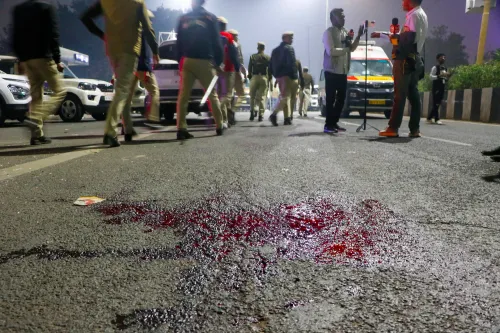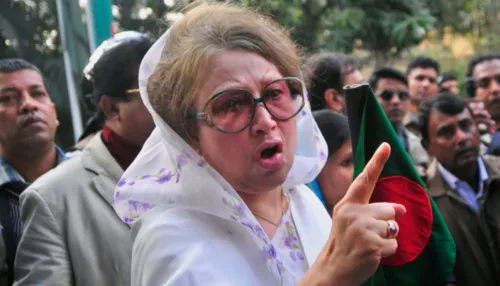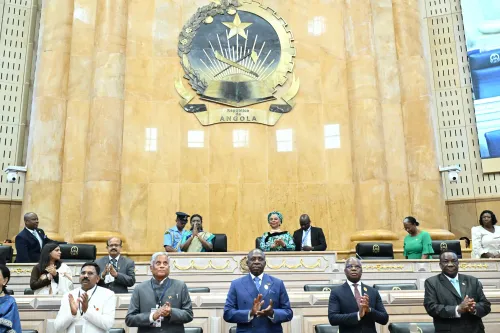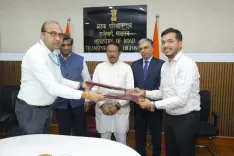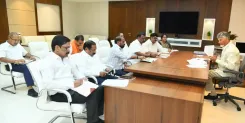Should Palestinian and Egyptian Presidents Call for Immediate End to Israeli Offensive in Gaza?

Synopsis
Key Takeaways
- Immediate ceasefire is urgently needed in Gaza.
- International community must respond to the humanitarian crisis.
- Leaders call for bold action against Israeli military operations.
- Humanitarian aid and medical supplies are crucial for Gaza's residents.
- Long-term peace requires addressing the Israeli occupation and Palestinian rights.
Baghdad, May 18 (NationPress) Palestinian President Mahmoud Abbas and Egyptian President Abdel-Fattah al-Sisi have called for an urgent and lasting ceasefire in the Gaza Strip.
During the 34th Arab League Summit convened in Baghdad on Saturday, Abbas urged the assembly to endorse an Arab initiative aimed at halting Israeli military actions and fostering peace in the area, as reported by Xinhua.
Since Thursday, Israeli forces have claimed the lives of hundreds of Palestinians, marking one of the most intense bombardments since a ceasefire ended in March, coinciding with US President Donald Trump's Middle East visit.
Abbas highlighted that a sustainable peace can only be attained by ending the Israeli occupation and guaranteeing the complete rights of the Palestinian community.
In his remarks, Sisi condemned the "systematic atrocities and unspeakable violence" perpetrated against Palestinians in Gaza over the last 19 months, asserting that such actions aim to "obliterate" the population.
He urged the global community, particularly the US, to take decisive measures to alleviate the humanitarian crisis in Gaza.
Sisi also reiterated Egypt's dedication to organizing an international conference for the swift recovery and reconstruction of Gaza once hostilities cease.
In response to the summit, the Hamas-affiliated media office in Gaza encouraged participants to take tangible steps and adopt courageous stances to dismantle the "unjust blockade" on Gaza and halt the ongoing violence.
It called for increased pressure on Israel to ensure the immediate and unconditional reopening of border crossings and to facilitate the delivery of food, humanitarian aid, and medical supplies to Gazans, who are facing potential starvation.
Lebanese Prime Minister Nawaf Salam also condemned Israeli aggression during the summit, urging the international community to intervene to stop Israeli assaults in Lebanon, which breach agreements made in late November last year.
"We implore you, dear brothers, to urge the international community to compel Israel to cease its aggressions and withdraw from all Lebanese territories," Salam stated.
The summit saw participation from leaders and senior diplomats of 22 Arab League member nations, alongside representatives from various regional and international organizations.
Notably, this marks the second such gathering hosted by Iraq since the 2003 US invasion, following a previous summit in 2012.
After a six-week ceasefire, Israel imposed a comprehensive blockade on Gaza and resumed its military operations in March, attributing civilian casualties to Hamas militants operating in proximity to civilians, a claim Hamas refutes.
Israel's stated objective is to dismantle the military and governmental capabilities of Hamas, which launched an attack on Israeli communities on October 7, 2023, resulting in approximately 1,200 deaths and over 250 hostages taken.
The military actions have devastated the densely populated enclave, displacing nearly all of its 2.3 million residents and resulting in over 53,000 fatalities, according to health authorities in Gaza.
Israel is under increasing international pressure to resume ceasefire discussions and permit essential food and medical supplies into Gaza.
UN aid chief Tom Fletcher questioned the Security Council this week regarding its willingness to act to "prevent genocide".
In a statement, Iraq's Prime Minister Mohammed Shia al-Sudani revealed the establishment of a fund to assist in the reconstruction of Arab nations post-conflict, with an initial commitment of $20 million each for Gaza and Lebanon, where extensive damage occurred last year due to an Israeli campaign against the Hezbollah group.

